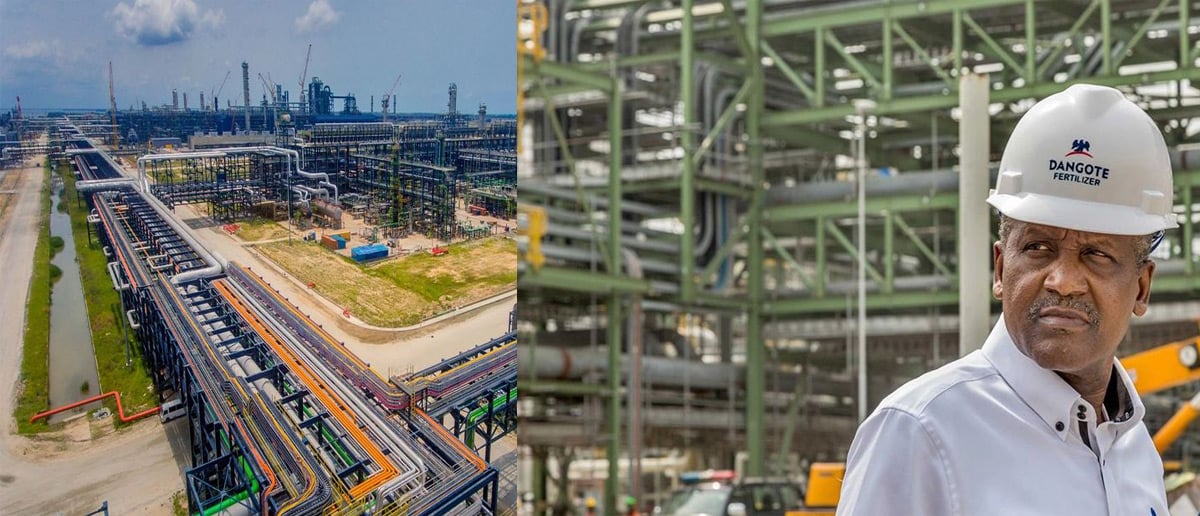Dangote Oil Refinery - Revolutionizing Nigeria's Energy Sector and Economic Landscape

The Dangote Oil Refinery, a monumental project by Africa's richest man, Aliko Dangote, is set to transform Nigeria's energy sector and profoundly impact the country's economy. This state-of-the-art refinery, the largest in Africa, promises to address Nigeria's long-standing dependence on imported petroleum products while creating job opportunities and stimulating economic growth.
Title: Dangote Oil Refinery: Revolutionizing Nigeria's Energy Sector and Economic Landscape
In this article, we delve into the introduction, history, equipment, types of products expected, market potential, and the transformative impact the Dangote Oil Refinery will have on Nigeria's economy.
History:
The history of the Dangote Oil Refinery traces back to the vision and determination of Aliko Dangote, a Nigerian businessman, and entrepreneur. Here is a chronological overview of the history of the Dangote Oil Refinery:
1. Project Announcement (2013): In September 2013, Aliko Dangote, the President, and CEO of the Dangote Group, announced plans to build the largest oil refinery and petrochemical plant in Nigeria. The project aimed to address the country's refining challenges, reduce import dependency, and boost Nigeria's self-sufficiency in petroleum products.
2. Construction Commencement (2016): Construction of the Dangote Oil Refinery began in 2016. The refinery is situated in the Lekki Free Trade Zone, located on the outskirts of Lagos, Nigeria. The strategic location provides access to transportation routes, export facilities, and a skilled workforce.
3. Strategic Partnerships (2017-2019): The Dangote Oil Refinery project attracted significant interest and partnerships from renowned global companies. In 2017, Dangote Group entered into an agreement with Saipem, an Italian multinational oil and gas industry contractor, for the engineering, procurement, and construction of the refinery.
In 2019, a strategic partnership was formed with Honeywell UOP, an American company specializing in refining and petrochemical technologies, to supply essential equipment and technology.
4. Milestone Achievements (2019-2020): The Dangote Oil Refinery achieved several significant milestones during this period. In July 2019, the installation of the world's most giant atmospheric tower (CDU) was completed, marking a crucial step in the construction process. In May 2020, the refinery's crude distillation unit was successfully hydro tested, ensuring the integrity and functionality of the equipment.
5. Completion and Commissioning (2022-2023): The construction of the Dangote Oil Refinery is expected to concluded in late 2022, followed by the commissioning and testing phases on May 2023. The commissioning phase involves rigorous testing, performance evaluations, and ensuring safety and environmental standards compliance. Once fully operational, the refinery aims to reach its maximum refining capacity of 650,000 barrels per day.
The history of the Dangote Oil Refinery showcases the vision, commitment, and ambition of Aliko Dangote to transform Nigeria's energy sector.
The project represents a significant milestone in Nigeria's journey towards achieving energy self-sufficiency, reducing import dependency, and promoting industrial growth. The refinery's completion and operation will mark a pivotal moment in Nigeria's refining history and contribute to the country's economic development.
Equipment and Technology:
The Dangote Oil Refinery has advanced equipment and state-of-the-art technology to ensure efficient, high-quality refining processes. While the specific details of the refinery's equipment may vary, depending on the particular units and configuration, here are some of the vital equipment commonly found in modern oil refineries, including the Dangote Oil Refinery:
1. Crude Distillation Unit (CDU): The CDU separates crude oil into various fractions based on their boiling points. It comprises a series of distillation columns, heat exchangers, pumps, and fractionation towers.
2. Hydrocracker Unit: Hydrocracker is a novel process that uses hydrogenation to hydrocarbons remove sulfur and CARBON using steam jet cracking. This process is designed for heavy oil fractions, including those that tribologists have used. It involves using catalysts, high-pressure reactors, and sophisticated fractionation systems.
3. Catalytic Reforming Unit: This unit uses a catalyst to convert low-quality naphtha into high-octane gasoline and other valuable products. It typically includes reactors, reforming catalysts, and fractionation equipment.
4. Alkylation Unit: The alkylation unit combines light olefins, such as propylene and butylene, with isobutane to produce high-octane blending components for gasoline. The process involves acid catalysts, reactors, and fractionation systems.
5. Isomerization Unit: The isomerization unit converts normal butane and normal pentane into isobutane and iso-pentane. This process improves the quality and octane rating of gasoline components. It utilizes catalysts, reactors, and fractionation equipment.
6. Fluid Catalytic Cracking Unit (FCCU): Using a fluidized catalyst, the FCCU breaks down heavy hydrocarbon molecules into lighter fractions. This unit produces gasoline, diesel, and other valuable products. It comprises reactors, regenerators, cyclones, and fractionation systems.
7. Delayed Coker Unit: The delayed coker unit processes heavy residues from the crude distillation process to produce valuable petroleum coke, gas oil, and other products. It involves coking drums, heaters, coke-cutting systems, and fractionation equipment.
8. Vacuum Distillation Unit: The unit operates under reduced pressure to separate heavy crude oil fractions into various products, including vacuum gas oil, vacuum residue, and asphalt. It consists of vacuum towers, heat exchangers, and condensers.
9. Desalting Unit: The desalting unit removes impurities, such as salts and water, from crude oil before it enters the refining process. It employs electrostatic coalescers, separators, and desalters.
10. Utilities and Offsite Facilities: The refinery includes a range of utilities and offsite facilities, such as power generation systems, water treatment plants, storage tanks, loading and unloading facilities, and various auxiliary units necessary for smooth refinery operations.
The refinery's advanced technology and equipment ensure efficient refining processes, high product quality, and environmental and safety standards compliance. For instance, these are some of the most common equipment in oil refineries. This includes a deep-sea offshore drilling platform and a natural gas fluidized bed combustion furnace.
Types of Products Expected:
The Dangote Oil Refinery, the largest refinery in Africa with a refining capacity of 650,000 barrels per day, is expected to produce a diverse range of high-quality petroleum products. Here are the types of products that the Dangote Oil Refinery is anticipated to grow:
1. Gasoline (Petrol): The refinery will produce gasoline, an essential fuel for automobiles and other combustion engines. The gas produced by the Dangote Oil Refinery will meet stringent quality standards and offer high octane ratings.
2. Diesel: The refinery will produce diesel fuel, which is widely used for transportation, industrial applications, and power generation. The diesel produced will be low sulfur content, meet environmental regulations, and ensure cleaner combustion.
3. Aviation Fuel (Jet A1): The Dangote Oil Refinery will also produce aviation fuel, specifically Jet A1, which is used for aviation turbine engines in commercial and military aircraft. This ensures a reliable and locally sourced supply of aviation fuel within Nigeria.
4. Liquefied Petroleum Gas (LPG): LPG, commonly known as cooking gas, is a clean-burning fuel used for cooking, heating, and various industrial applications. The Dangote Oil Refinery will produce LPG, providing an essential energy source for households and businesses.
5. Kerosene: Kerosene is a fuel that can be used in many places. It is most commonly used as an energy source in homes, workplaces, and industrial settings. The refinery will produce kerosene, catering to both domestic and industrial demands.
6. Low-Sulfur Diesel: The Dangote Oil Refinery aims to produce low-sulfur diesel, which has reduced sulfur content compared to conventional diesel fuel. Low-sulfur diesel helps mitigate air pollution and meets stringent environmental standards.
7. Naphtha: Naphtha is a light hydrocarbon liquid used as a feedstock for producing petrochemicals, such as plastics, solvents, and synthetic fibers. The Dangote Oil Refinery will produce naphtha to support Nigeria's growing petrochemical industry.
8. Asphalt: The refinery will also produce asphalt, a sticky, black, and highly viscous substance used primarily for road construction, waterproofing, and roofing. The production of asphalt will contribute to Nigeria's infrastructure development.
9. Petroleum Coke: Petroleum coke, or pet coke, is a solid carbon material derived from oil refining processes. It finds applications in fueling power plants, cement kilns, and other industrial processes. The refinery will produce petroleum coke as a valuable byproduct.
It is worth noting that the Dangote Oil Refinery's product slate may vary depending on market demand, regulations, and specific refining processes.
The refinery's wide range of petroleum products will significantly reduce Nigeria's dependence on imported refined products, enhance energy security, and contribute to the nation's economic growth and self-sufficiency in the energy sector.
Market Potential:
The Dangote Oil Refinery holds immense market potential, both domestically and internationally. Some key factors that contribute to its market potential include:
1. Meeting Domestic Demand: with its large population and growing economy, Nigeria has a substantial demand for petroleum products. The Dangote Oil Refinery's refining capacity of 650,000 barrels per day will significantly reduce Nigeria's dependence on imported petroleum products.
2. Enhance Energy Security: The refinery will enhance energy security and reduce the country's import bill by meeting a significant portion of the domestic demand for gasoline, diesel, aviation fuel, and other refined products.
3. Substituting Imports: Nigeria relies heavily on imported petroleum products to meet its domestic demand. The Dangote Oil Refinery aims to bridge this gap by producing high-quality products locally. Substituting imports with domestically produced petroleum products will save costs, conserve foreign exchange reserves, and improve the country's trade balance.
4. Export Potential: The surplus production capacity of the Dangote Oil Refinery presents significant export opportunities. With its strategic location in Africa, Nigeria can serve as a regional hub for petroleum product exports.
5. Produce Different Oil Products: The refinery's ability to produce a diverse range of products, including gasoline, diesel, and aviation fuel, positions Nigeria to cater to the energy needs of neighboring countries and potentially expand its market reach to other African nations.
6. Regional Integration: The Dangote Oil Refinery aligns with the African Continental Free Trade Area (AFCFTA) agreement, which seeks to promote intra-African trade and economic integration. By producing and exporting petroleum products, Nigeria can play a vital role in regional energy supply chains, fostering economic cooperation and integration within the continent.
7. Downstream Industry Development: Establishing the Dangote Oil Refinery will contribute to developing downstream industries in Nigeria. The availability of locally produced petroleum products will stimulate various sectors, such as transportation, manufacturing, agriculture, and construction. This, in turn, will create opportunities for job creation, industrial growth, and overall economic development.
8. Foreign Investment and Technology Transfer: The Dangote Oil Refinery project has attracted significant foreign investment, with partnerships and collaborations with renowned global companies.
9. Technology Transer: The involvement of international partners brings expertise, advanced technology, and best practices to the Nigerian energy sector. This transfer of knowledge and technology will further enhance the competitiveness and market potential of the Dangote Oil Refinery.
10. Long-Term Sustainability: The Dangote Oil Refinery is designed to meet international quality, efficiency, and environmental sustainability standards. With a focus on producing cleaner fuels, such as low-sulfur diesel, the refinery aligns with global trends and regulations to reduce emissions and address climate change concerns.
This commitment to sustainability enhances the market potential of the refinery by catering to the increasing demand for cleaner and greener energy solutions.
In summary, the Dangote Oil Refinery has significant market potential to meet Nigeria's domestic demand and explore export opportunities. By reducing import dependency, promoting regional integration, and stimulating downstream industries, the refinery is poised to substantially impact Nigeria's energy sector and contribute to the nation's economic growth.
Impact on Nigeria's Economy:
The Dangote Oil Refinery has the potential to have a transformative impact on Nigeria's economy in several ways:
1. Job Creation: The construction and operation of the Dangote Oil Refinery will generate many direct and indirect employment opportunities. A large workforce will be required during the construction phase, including engineers, technicians, laborers, and support staff.
Once operational, the refinery will create numerous permanent jobs in various areas, including operations, maintenance, logistics, and administration. This job creation will help reduce unemployment rates, alleviate poverty, and improve many Nigerians' living standards.
2. Economic Growth and Industrial Development: Establishing the Dangote Oil Refinery will stimulate economic growth and foster industrial development. The construction phase alone will require substantial investments in infrastructure, materials, and services, boosting economic activity in the region. The refinery's operations will create opportunities for ancillary industries, such as transportation, logistics, and supply chain services. This multiplier effect will contribute to the overall development of the Nigerian economy.
3. Reduction in Import Dependency: Nigeria relies heavily on imported petroleum products to meet domestic demand. The Dangote Oil Refinery aims to address this issue by locally producing a range of refined products. The refinery's ability to substitute imports with domestically produced petroleum products will positively impact Nigeria's economy and reduce the country's vulnerability to fluctuations in global oil prices. Nigeria can conserve foreign exchange reserves by reducing import dependency, improving its trade balance, and enhancing energy security.
4. Foreign Exchange Earnings: Dangote Oil Refinery can generate significant earnings through its exports, a key factor in its business growth. These foreign exchange earnings can be used to finance infrastructure development, social programs, and other vital sectors of the economy.
The surplus production capacity of the refinery, coupled with its strategic location in Africa, positions Nigeria as a critical player in the regional and international petroleum market. By exporting refined products, Nigeria can earn foreign exchange, improve its trade balance, and strengthen its currency.
5. Technological Advancement and Skills Development: The Dangote Oil Refinery brings advanced technology and expertise to the Nigerian energy sector.
Through partnerships and collaborations with international companies, the refinery will facilitate the transfer of knowledge, skills, and technology to local workers and institutions. This technology transfer will contribute to the development of human capital, enhance the technical capabilities of the Nigerian workforce, and foster innovation in the energy sector.
6. Downstream Value Addition: The Dangote Oil Refinery will support the development of downstream industries in Nigeria. By operating locally and producing high-quality products, the refinery will provide sustainable feedstock for transportation, manufacturing, agriculture, and construction industries.
This value addition in the downstream sector will stimulate economic diversification, promote industrial growth, and create opportunities for entrepreneurship and investment.
Overall, the Dangote Oil Refinery has the potential to play a pivotal role in Nigeria's economic transformation. Through job creation, industrial development, import substitution, foreign exchange earnings, technological advancement, and downstream value addition, the refinery will contribute significantly to Nigeria's economic growth, improve energy security, and enhance the country's overall competitiveness in the global market.
Earlier Launched a Fertiliser Manufacturing Plant on 22 March 2023
The Dangote Fertilizer Plant, a groundbreaking project in Nigeria's agricultural sector, was opened for active operation on 22 March 2023. This state-of-the-art facility built by the Dangote Group can represent a significant milestone in Nigeria's quest for self-sufficiency in the production of fertilizer. Here are the key details and significance of the Dangote Fertilizer Plant:
1. Inauguration: The Dangote Fertilizer Plant was officially inaugurated on 22 March 2023 by President Mohammadu Buhari in a grand ceremony attended by top government officials, industry leaders, and international dignitaries. The inauguration began its operation and showcased Nigeria's commitment to agricultural development and food security.
2. Production Capacity: The Dangote Fertilizer Plant boasts an impressive production capacity of 4 to 7 million metric tons of urea fertilizer per annum. This substantial capacity positions the plant as one of the largest single-train urea fertilizer plants globally.
3. Advanced Technology: The plant incorporates cutting-edge technology and modern equipment sourced from leading global suppliers, ensuring efficient and high-quality fertilizer production. Advanced technology allows for precise control of the production process, optimizing resource utilization and minimizing environmental impact.
4. Fertilizer Product: The Dangote Fertilizer Plant primarily produces urea fertilizer. Urea is a nitrogen-rich fertilizer widely used in agricultural practices to enhance crop productivity. The production of urea fertilizer locally reduces Nigeria's reliance on imported fertilizers and contributes to the country's agricultural self-sufficiency.
5. Quality Standards: The Dangote Fertilizer Plant adheres to stringent quality control measures. The produced fertilizer meets international standards, ensuring farmers have access to high-quality fertilizers that effectively meet the nutritional needs of crops and contribute to increased yields and overall agricultural productivity.
6. Market Impact: Commencing operations at the Dangote Fertilizer Plant is a significant development for Nigeria's agricultural sector. The plant's production capacity and high-quality fertilizer will have a transformative impact on the domestic fertilizer market. The increased availability of locally produced fertilizers will benefit Nigerian farmers by improving access, affordability, and the overall quality of fertilizers used in crop cultivation.
7. Agricultural Development: The Dangote Fertilizer Plant aligns with Nigeria's development goals. By producing urea fertilizer locally, the plant supports the government's efforts to promote sustainable agriculture, boost food production, and reduce the country's dependence on imported fertilizers. The availability of affordable and accessible fertilizers is crucial for smallholder farmers and large-scale agricultural operations.
8. Job Creation and Economic Growth: Establishing the Dangote Fertilizer Plant has created numerous employment opportunities at various levels, including skilled and unskilled workers, technicians, engineers, and administrative staff. This job creation contributes to poverty alleviation, enhances livelihoods, and stimulates economic growth in the surrounding communities and the country.
9. Industrial Synergies: The Dangote Fertilizer Plant complements the activities of the Dangote Oil Refinery, another ambitious project by the Dangote Group. The refinery produces a variety of petroleum-based byproducts, such as naphtha, which can be used as a feedstock for fertilizer production. This synergy between the two facilities fosters integration, value addition, and a circular economy approach within the Dangote Group's operations.
The Dangote Fertilizer Plant's active operation signifies a major achievement in Nigeria's agricultural and industrial landscape. With its significant production capacity, advanced technology, and adherence to quality standards, the plant plays a vital role in supporting Nigeria's agricultural sector, enhancing food security, and driving economic growth.
Conclusion:
The Dangote Oil Refinery represents a landmark achievement for Nigeria's energy sector and economy. With its advanced technology, comprehensive range of products, and vast market potential, the refinery is set to revolutionize Nigeria's petroleum industry.
As the largest refinery in Africa, it will enhance energy self-sufficiency, create employment opportunities, attract foreign investment, and contribute to economic growth. The Dangote Oil Refinery is a testament to Nigeria's determination to harness its resources, reduce import dependency, and shape a prosperous and self-reliant future.
Dangote Company Address and Location
https://www.finelib.com/listing/Dangote-Group-of-Companies/5941/




